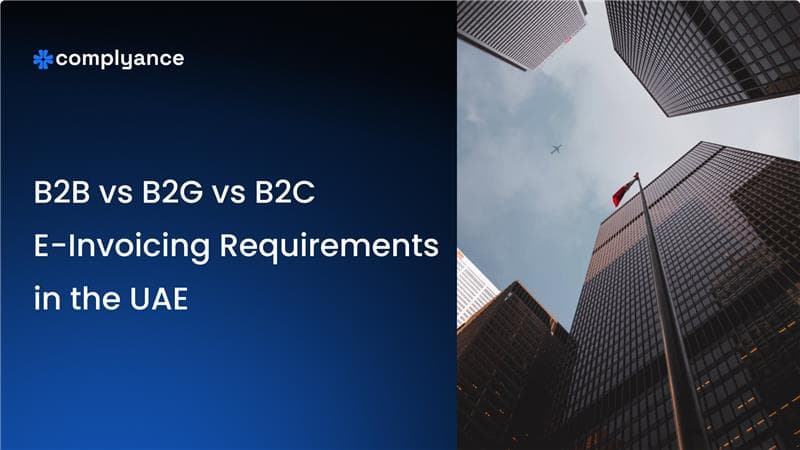B2B vs B2G vs B2C E-Invoicing Requirements in the UAE
Explore the UAE’s e-invoicing rules for B2B, B2G, and B2C transactions. Learn about PINT AE format, Peppol standards, and how Complyance ensures fast, compliant e-invoicing across all transaction types.

Table of Contents
The UAE is accelerating its journey toward a fully digital e-invoicing system.This shift replaces traditional paper or PDF invoices with a real-time, automated, and structured digital framework that standardizes how businesses issue, exchange, and report invoices.
Under the UAE’s Decentralized Continuous Transaction Control and exchange (DCTCE) framework, based on the Peppol Continuous Transaction Control (CTC) model, all B2B (business-to-business) and B2G (business-to-government) invoices must soon be issued and transmitted electronically in a structured PINT AE format through an accredited service provider (ASP).
This ensures that every invoice is validated, securely exchanged, and reported to the Federal Tax Authority (FTA) in real time.
For B2C (business-to-consumer) transactions, e-invoicing is not currently mandated in the UAE.The Federal Tax Authority has indicated that B2C e-invoicing may be introduced in future phases, but official updates are still awaited. Businesses should stay informed as the UAE continues progressing toward full digital e-invoice reporting across all transaction types.
Let’s break down the key differences and specific requirements for each transaction type, B2B, B2G, and B2C, under the UAE’s evolving e-invoicing framework.
What Is E-Invoicing?
E-invoicing is the process of creating, transmitting, receiving, and processing invoices electronically in a structured, machine-readable format. It replaces traditional paper invoices or static PDF documents with machine readable data files (like XML or JSON) that can be read, validated, and transmitted directly between systems without manual intervention.
Key Characteristics
- Structured and machine-readable: Unlike PDFs or Word files, e-invoices are standardized data files that systems can automatically interpret and process.
- Fully digital lifecycle: Every stage from creating, sending, receiving, validating, and archiving happens electronically.
- Automated processing: Invoice data integrates directly into ERP systems, minimizing manual work, and accelerating reconciliation.
- Enhanced compliance and transparency: Each e-invoice creates a digital audit trail, making VAT reporting and real-time verification simpler for both businesses and the FTA.
Understanding B2B, B2G, and B2C Transactions in the UAE
B2B (Business-to-Business)
- Transaction happens between: Two VAT-registered businesses.
- Example: A logistics company invoicing a retail chain for delivery services.
- Instructions from FTA: From July 2026, all B2B invoices must be issued in the structured XML format (PINT AE) and submitted through an Accredited Service Provider (ASP) to the Federal Tax Authority (FTA) via the Peppol network.
B2G (Business-to-Government)
- Transaction happens between: A private business and a government department or public-sector entity.
- Example: An IT company sending an invoice to a UAE ministry for a software project.
- Instructions from FTA: B2G invoices must also follow the PINT AE format and be transmitted electronically through an ASP for real-time reporting and validation by the FTA.
B2C (Business-to-Consumer)
- Transactions happen between: A business and an individual customer (not VAT-registered).
- Example: A clothing brand selling products to customers in-store or online.
- Instructions from FTA: Not mandatory yet. Businesses can continue issuing simplified invoice. The FTA may include B2C e-invoicing in later phases, so companies are encouraged to prepare for digital readiness.
Key Differences Between B2B, B2G, and B2C E-Invoicing in the UAE
| Feature | B2B / B2G | B2C |
|---|---|---|
| Mandate | Mandatory from Jan 2027 | Not yet mandatory |
| Invoice Format | Structured XML (PINT AE) | Not applicable at this stage |
| Data Reporting | Real-time reporting to the FTA via ASP | Updates awaited |
| Validation Process | Required before exchange | Updates awaited |
| Archiving | Mandatory per FTA standards | Updates awaited |
| Regulatory Oversight | High – involves both FTA and ASPs | Updates awaited |
What’s Common Across All Three Transaction Types
Even though the rules differ for B2B, B2G, and B2C transactions, some key principles stay the same for everyone. These shared standards ensure that every business in the UAE operates with accuracy, transparency, and digital readiness.
- Accuracy: Every invoice must include correct VAT details, Tax Registration Numbers (TRNs), and item-level information.
- Authenticity and Integrity: Invoices, whether paper or digital, must be verifiable and protected against tampering.
- Archiving: Businesses are required to store and maintain invoice records for the period of time set by the FTA for audits or verification.
- Digital Readiness: Even companies handling B2C transactions are encouraged to adopt digital tools and structured formats to prepare for future e-invoicing phases.
Together, these common rules support the UAE’s broader goal of creating a transparent, secure, and digitally connected business environment where all types of transactions can be tracked and validated in real time.
Key E-Invoicing Requirements for B2B and B2G Transactions
For B2B and B2G transactions, the UAE e-invoicing framework defines a clear set of obligations:
- Mandatory Compliance (from Jan 2027): All VAT-registered businesses issuing invoices to other VAT-registered businesses or government entities must comply.
- Structured Format (PINT AE XML): Every invoice must follow the standard Peppol PINT AE schema, which supports structured, machine-readable data.
- Submission via Accredited Service Provider (ASP): Businesses must connect to an accredited ASP, which handles validation and submission through the Peppol network.
- Real-Time Data Reporting: The ASP transmits invoice data to both the buyer’s ASP and the FTA instantly for validation and audit readiness.
- Security and Archiving: Invoices must be digitally signed, timestamped, and stored securely in compliance with FTA retention policies.
These processes ensure transparency, prevent fraud, and make VAT reporting almost effortless for businesses once integrated correctly.
B2C E-Invoicing
While B2C transactions are not currently mandated under the UAE’s e-invoicing framework, this is expected to change in the future.The Federal Tax Authority (FTA) has signaled that B2C e-invoicing may follow in upcoming phases, similar to regional precedents like Saudi Arabia’s rollout.Official updates are awaited, and businesses should stay informed to ensure readiness when the mandate is announced.
Benefits of E-Invoicing in the UAE
The UAE’s e-invoicing system brings advantages that extend beyond compliance.
For Businesses:
Enhanced Accuracy and Reduced Errors: Automated validation in e-invoicing minimizes human errors such as duplicate or incorrect invoices, improving data quality and reducing costly disputes or rework.
Stronger Regulatory Compliance: E-invoicing platforms automatically align with evolving tax rules and audit requirements, helping businesses stay compliant and avoid penalties.
Better Business Insights from Invoice Data: Digital invoices provide rich, real-time data that can be analyzed to identify payment trends, optimize working capital, and improve financial forecasting.
Seamless Global Business Transactions: E-invoicing enables easy integration with international partners and supports multiple tax jurisdictions, simplifying cross-border trade and compliance.
Improved Customer and Supplier Relationships: Faster, error-free invoicing fosters trust with customers and suppliers, strengthening relationships and facilitating smoother business operations.
Faster Payments and Improved Cash Flow: E-invoicing streamlines the invoicing cycle by automating approvals and eliminating manual delays, enabling your business to receive payments more quickly and enhance cash flow management.
For the Government:
- Greater VAT Transparency: Real-time reporting ensures every transaction is tracked and verified, reducing tax evasion and underreporting.
- Data-Driven Oversight: Access to structured invoice data helps authorities monitor transaction trends and detect irregularities early.
- Efficient Audits and Enforcement: Automated data exchange simplifies verification, enabling faster and more targeted compliance checks.
- Enhanced Public Trust: Transparent financial systems increase taxpayer confidence and strengthen the UAE’s reputation as a modern, well-regulated economy.
- Smarter Policy Decisions: Reliable invoice data supports economic planning and the design of evidence-based tax policies.
For Consumers:
- Accurate Billing: Every invoice will reflect precise tax and price details, ensuring transparency in consumer transactions.
- Easy Returns and Records: Digitally stored invoices simplify refund processes and make it easy for consumers to track their purchases.
- Increased Confidence: Standardized digital invoices reduce fraud risk and give consumers confidence in the accuracy of their receipts.
How Complyance Makes E-Invoicing Simple for Every Transaction Type
Complyance is the preferred e-invoicing platform for over 1,000 businesses worldwide, helping companies achieve fast, reliable, and fully compliant e-invoicing in the UAE and beyond. With more than five years of global e-invoicing experience, Complyance enables organizations to go live within weeks, avoiding delays, penalties, and e-invoicing compliance errors while ensuring smooth alignment with the Federal Tax Authority (FTA). Whether you are part of an IT or developer team, a finance department, or leading tax compliance initiatives, Complyance makes managing e-invoicing simple, secure, and completely automated across B2B, B2G, and B2C transactions.
B2B (Business-to-Business) E-Invoicing with Complyance
For VAT-registered businesses transacting with other businesses, Complyance simplifies every step of e-invoicing from integration to real-time FTA reporting.
How It Helps
- Fast Go-Live: Businesses can integrate and go live within a week, up to 10× faster than traditional e-invoicing vendors.
- End-to-End Compliance: Supports PINT AE XML format and the DCTCE framework, ensuring every invoice meets FTA standards.
- One API for Global Compliance: Through our GETS framework, businesses can use the same API for UAE and other global mandates, including Saudi Arabia, Malaysia, and Belgium.
- 100+ Automated Validations: Each invoice undergoes over 100 technical and regulatory checks before submission to ensure first-time approval.
- Seamless ERP Integration: Works with SAP, Oracle, Microsoft Dynamics, Infor, QuickBooks, Zoho, Xero, Epicor, and more, without requiring major ERP changes.
- Real-Time Reporting and Reconciliation: Automatically maps and validates invoice data, ensuring accurate VAT reporting and faster settlements.
- Secure and Certified: ISO 27001, SOC 2, and GDPR compliant to ensure complete data protection.
Key Outcome: Businesses achieve faster e-invoicing compliance, fewer errors, and seamless integration with their existing systems, reducing manual work and audit risks.
B2G (Business-to-Government) E-Invoicing with Complyance
For companies working with UAE government departments and public-sector entities, e-invoicing compliance requires extra validation and transparency. Complyance ensures every B2G invoice is properly formatted, verified, and securely transmitted to the FTA.
How It Helps
- FTA-Aligned XML format: Automatically generates and validates invoices in the PINT AE XML format for B2G compliance.
- Secure, Real-Time Submissions: Invoices are securely transmitted via an Accredited Service Provider (ASP) through the Peppol network for real-time validation by the FTA.
- Automated Tax Reconciliation: Matches ERP data with FTA submissions to eliminate mismatches and manual follow-ups.
- Audit-Ready Dashboards: Real-time monitoring and reporting ensure businesses remain fully e-invoicing compliant during audits or inspections.
- Enterprise-Level Security: Every invoice is digitally signed, encrypted, and archived as per UAE retention standards.
Key Outcome: Businesses gain transparency, faster approvals, and consistent e-invoicing compliance in all transactions with UAE government entities.
B2C (Business-to-Consumer) E-Invoicing with Complyance
While B2C e-invoicing is not yet mandatory in the UAE, Complyance enables companies to modernize their consumer invoicing workflows and prepare early for future mandates.
How It Helps
- Simplified Invoice Creation: Generate digital receipts with accurate VAT data for both online and in-store transactions.
- Future-Ready APIs: Businesses can easily switch to e-invoicing compliance once B2C regulations become mandatory, no rework or redevelopment required.
- Multi-Entity and Multi-Country Tracking: Unified analytics dashboard to monitor invoice performance across branches, locations, and regions.
- Faster Checkout and Delivery: Automated invoice generation reduces delays at the point of sale, improving customer experience.
- Data Security and Storage: All invoices are stored securely with encryption and access control, meeting ISO and SOC 2 standards.
Key Outcome: Businesses enhance operational efficiency, improve customer experience, and ensure full readiness for the upcoming B2C e-invoicing phase.
Why Businesses Choose Complyance
- 5 Years of E-Invoicing Expertise
- One Global API for the UAE and Other Countries
- 1.5 Billion E-Invoices Processed Annually
- 100% Success Rate in Invoice Generation
- Trusted by 1,000+ Companies Worldwide
With Complyance, you can manage all B2B, B2G, and B2C invoice flows from a single platform. Our developer-first API, global Peppol integration, and automated compliance checks make e-invoicing faster, safer, and easier—helping your business stay fully compliant with the UAE’s e-invoicing framework while preparing for what’s next in global tax digitalization.
Conclusion
The UAE’s e-invoicing reform marks a major step toward a transparent, digital-first economy. While B2B and B2G e-invoicing will soon be mandatory under the FTA’s DCTCE framework, B2C businesses have a unique opportunity to prepare early and stay ahead of future regulations. Across all transaction types, the message is clear: automation, accuracy, and compliance are no longer optional.
Complyance makes this transition simple for every business. Whether you issue invoices to other enterprises, government entities, or consumers, Complyance provides one secure, unified platform to automate validation, reporting, and submission through an accredited network. With fast integration, real-time compliance, and global scalability, it helps you stay e-invoicing compliant today while preparing for the digital tax ecosystem tomorrow.
Related posts
Frequently Asked Questions
E-invoicing is the process of issuing, transmitting, and processing invoices in a structured, machine-readable digital format, such as XML or JSON, instead of traditional paper or PDF documents.
To standardize, automate, and digitize how businesses create, validate, and report invoices, ensuring real-time compliance, VAT accuracy, and seamless integration with the Federal Tax Authority (FTA).
DCTCE stands for Decentralized Continuous Transaction Control and Exchange, the UAE's e-invoicing model based on the global Peppol Continuous Transaction Control (CTC) standard.
All B2B and B2G transactions involving VAT-registered businesses in the UAE. B2C transactions are currently voluntary but expected to be included later.
Businesses must store digital invoices for 5 years, with secure access and retrievability for audits. Real estate-related invoices require 15-year retention.
Subscribe to our Newsletter
Get the latest compliance updates, e-invoicing news, and expert tips delivered to your inbox.
ABOUT COMPLYANCE
Empowering businesses to automate e-invoicing and stay compliant in 100+ countries. Our platform simplifies regulatory complexity for enterprises and fast-growing companies.






